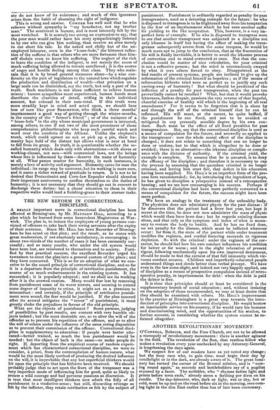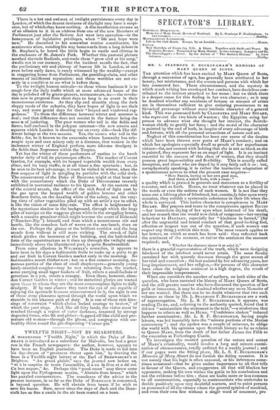ANOTHER REVOLUTIONARY MOVEMENT.
O'CoNateLL, Rebecca, and the Free Church, are not to be allowed a monopoly of revolutionary movements : there is another agitator in the field. The revolution of the Sun, that restless fellow who makes a revolution every year unchecked by any Attorney-General, is lengthening the days again.
We suspect few of our readers have as yet noted any change; but the busy race who, to gain time, must begin their day by candlelight or in the dark, are already aware of it. The great lumi- nary has turned the corner of the Brumal solstice, and is "com- ing round again," as seconds and bottleholders say of a pugilist stunned by a facer. The scribbler, who "rhymes before light and prints before term ends," already saves a farthing per diem on his candle. The day-labourer, who, dark or light, wet or dry, hot or cold, must be up and on the road before six in the morning, sees com- ing light in the dim East earlier than has of late been customary.
There is a bat and owl sort of twilight preexistence every day in London, of which the decent denizens of daylight may have a suspi- cion, but of which they know nothing. A dim recollection crosses us of an allusion to it in an address from one of the new Members of Parliament just after the Reform Act went into operation—in the honeymoon of legislative privileges when " life and hope were
new.' He described to his somewhat restive constituents, his
sentiments when, wending his way homewards from a long debate in St. Stephen's, he heard the birds begin to rustle and chirrup in the enclosure of St. James's Park. Whether this pastoral picture soothed the rude Radicals, and made them "grow civil at his song," dwells not in our memory. But the incident recalls the fact, that the preliminary stir and chirrup of human life in London, at and even before early dawn, is rarely witnessed by the wealthy—except in staggering home from Parliament, the gambling-clubs, and other resorts of indifferent reputation: and these worthies are not ex- actly in a condition to see what is before them.
To the twilight human animals—to those whose business it is to rough- hew the daily traffic which at more advanced hours of the day is polished off by green-grocers, restaurateurs, &c.—the revolu- tion now in progress from short days to long is an event in their monotonous existence. As they slip and stumble along the dark sloppy roads of the suburbs, they have hopes of light to see their
way, and more genial days for their "looped and windowed rag- gedness." To them the difference between winter and summer is
real ; and that difference does not consist in the former being the seascn of junketing. The poor women who toil in the fields and farms, half enclosed in the polypus antennae—the new streets and squares which London is shooting out on every side—look like dif- ferent beings at the two seasons. Yes, the women who toil in the fields ; for, be it known to the coxcombs whose humanity has tele- scopic eyes and sees misery only at a distance, that women in the inclement winter of England perform more irksome drudgery in the fields than Negresses within the Tropics. Yet has the winter of these performers of matins to the harsh tutelar deity of toil its picturesque effects. The market of Covent Garden, far example, with its heaped vegetable wealth from every clime, and its busy traffic, is at all times a fine spectacle ; but, to be seen to its best advantage, it must be visited in winter, when the first soupcon of light is mingling its particles with the solid dark.
The conservatory of the Duke of BEDFORD might at that hour vie with the conservatory which the Duke of DEVONSHIRE recently
exhibited in nocturnal radiance to his Queen. At the eastern end of the central arcade, the effect of the rich flood of light cast by the gas upon the heaped wealth of golden lemons and other Southern fruits, on the dazzling white of the celery, and the vary-
ing tints of other vegetables piled up with an artist's eye to effect, is like the vision of some fairy-tale. The effect is heightened by
the mysterious shadow in the background, through which the huge piles of turnips on the waggons gleam white in the straggling beams, with a massive grandeur which might become the court of Riibezahl ("Number-Nip") himself, and from which a monotonous stir and bustle, like the ceaseless lash of waves on the sea-beach, rises on the ear. Perhaps the glance at the brilliant corridor and the long arcade from without is still more striking. The streak of light which girdles the basement of the building, and the half-defined form of the superstructure as it rises up through the twilight space immediately above the illuminated part, is quite Rembrandtish.
From some allusions in WYCHERLY'S comedies, it appears to have been in his days a fashionable frolic to make up a party to go
and eat fruit in Covent Garden market early in the morning. No Sashionables resort thither now ; but on a fine summer morning, nu- merous parties of the class of small shopkeepers—generally young lately-married couples—may be met returning from the market, some carrying small taper baskets of fruit, others a small fuchsia or geranium in a pot, others a nosegay. Even these, however, aban- don Covent Garden in winter ; and its matutinal glories are wasted upon those to whom they are the more commonplace lights to daily drudgery. If by rare chance they meet the eye of one capable of enjoying the spectacle because unaccustomed to it, the sight is one of those stray pleasures spread through the world upon which we stumble in the irksome path of duty. It is one of those rich bles- sings of constraint "which choice lacked courage to bestow," of which the poet sings. And, like all fairy lands, the vision must be
reached through a region of outer darkness, tenanted by strange degraded forms, who flit and gibber—haggard elf-like child and pre- mature old woman—through the gloom, and congregate with un- healthy thirst round the gin-dispensing "Corner-pin."



























 Previous page
Previous page